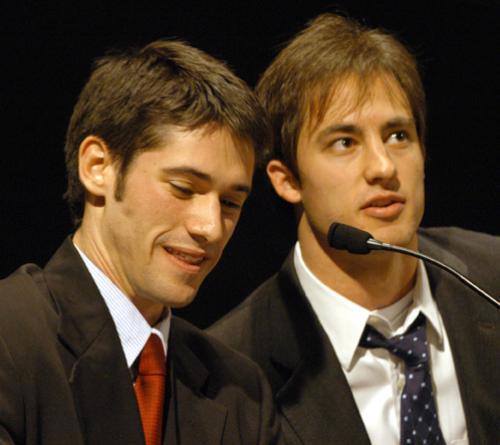
News
Summers Will Not Finish Semester of Teaching as Harvard Investigates Epstein Ties

News
Harvard College Students Report Favoring Divestment from Israel in HUA Survey

News
‘He Should Resign’: Harvard Undergrads Take Hard Line Against Summers Over Epstein Scandal

News
Harvard To Launch New Investigation Into Epstein’s Ties to Summers, Other University Affiliates

News
Harvard Students To Vote on Divestment From Israel in Inaugural HUA Election Survey
Council Hopefuls Go Head to Head

Rifts over campaign issues and council records emerged in a debate between the Undergraduate Council’s presidential candidates held yesterday.
All four candidates—Joshua A. Barro ’05, Aaron S. Byrd ’05, Matthew W. Mahan ’05 and Jason L. Lurie ’05—fielded questions from Crimson editor and former council reporter Alexander J. Blenkinsopp ’05, the audience and each other.
At the Science Center debate, they articulated platforms that focused on social life and student advocacy, but varied from broad visions for Harvard student life to more specific program proposals.
Mahan spoke of building a stronger Harvard community “where you care about the relationships,” arguing that his experience dealing with administrators as chair of the Student Affairs Committee (SAC) has prepared him for the presidency.
“Too many students are unhappy and unexcited to go to Harvard,” he said.
He presented solutions that ranged from improving mental health resources to increasing the number and quality of campus social events.
“We get kicked out of our parties at 1 a.m., though I may have taken care of that this morning,” said Mahan, who is currently working with administrators to extend party curfews.
Byrd insisted that he is “about ideas” like increasing Board Plus money, putting sourcebooks in every House library, extending hours that meals are served in the dining halls and attracting quality acts to Sanders Theatre.
He called Sanders “a venue that is ours that caters to elderly people.”
Byrd defended his relative lack of council experience, asserting that he was “trying to set a vision out there” of a president who will bring a fresh face to talks with administrators.
“I’m a common sense guy; I’m an honest person; the administration can be spoken to just like you and me,” he said.
Improving lighting on Cambridge Common in order to increase student safety and creating an online forum in which students could sell textbooks were two issues presented by Barro, who is chair of the council’s Finance Committee.
He also advocated capitalizing on “over-competitive” Harvard students in the constant quest to improve campus parties by offering cash prizes for the best events.
Lurie focused on universal keycard access and bringing back current council President Rohit Chopra ’04.
Lurie said that he would try to employ Chopra as a paid administrative assistant should he win the election.
“I’m not really running alone. I’m running with Rohit,” Lurie said. “Rohit’s the good cop. I’m the bad cop.”
All of the candidates had to respond to some questions from Blenkinsopp and each other about their achievements and their potential weaknesses.
Barro responded to questions about his people skills and his voting record.
When Barro was asked by Blenkinsopp about calling someone “an idiot” during a council meeting, he admitted to having a “confrontational” attitude, but insisted that it would be an asset for the council.
Early in the debate, Lurie directly attacked Barro, accusing him of voting against an amendment that would have increased grant money for student groups.
When Barro responded by pointing out that the council’s grant fund increased by $35,000 this year, Lurie said that there was only an increase because council member Justin R. Chapa ’05 found lost council money.
Barro said that Lurie was “simultaneosly [his] favorite and least favorite person,” on the council.
When asked about having a “fiery, sometimes hyperbolic” personality, Lurie compared his style to Chopra’s.
“[Chopra] was ready to burn bridges. That’s something I do well, damn-it,” he said.
But Lurie said that talking to administrators might be a problem for him.
“I’m kind of a jerk,” he reflected.
“We need to cut back on services that no one wants,” Lurie said. “We shouldn’t get craptastic bands.”
Mahan discussed concerns about how well his all-white-male ticket could represent students by insisting that he would reach out to students.
“This is not going to be a two-person administration,” he said.
In addition to student advocacy, much of the debate focused on Chopra’s term and how the council could maintain its relationship with administrators in the wake of his departure as council president.
“It’s all too tied up in Rohit,” Barro said. “It was all him and he’s going to be gone.”
Mahan, who has accused Chopra of micro-management, was asked to reconcile these statements with claims he has made regarding his own achievements on the council.
“The reality is that we have very different leadership styles. I don’t think that him micro-managing necessarily means I haven’t done anything,” he said.
The debate was co-sponsored by The Crimson and the Harvard Political Union.
—Staff writer Ebonie D. Hazle can be reached at hazle@fas.harvard.edu.
Want to keep up with breaking news? Subscribe to our email newsletter.
